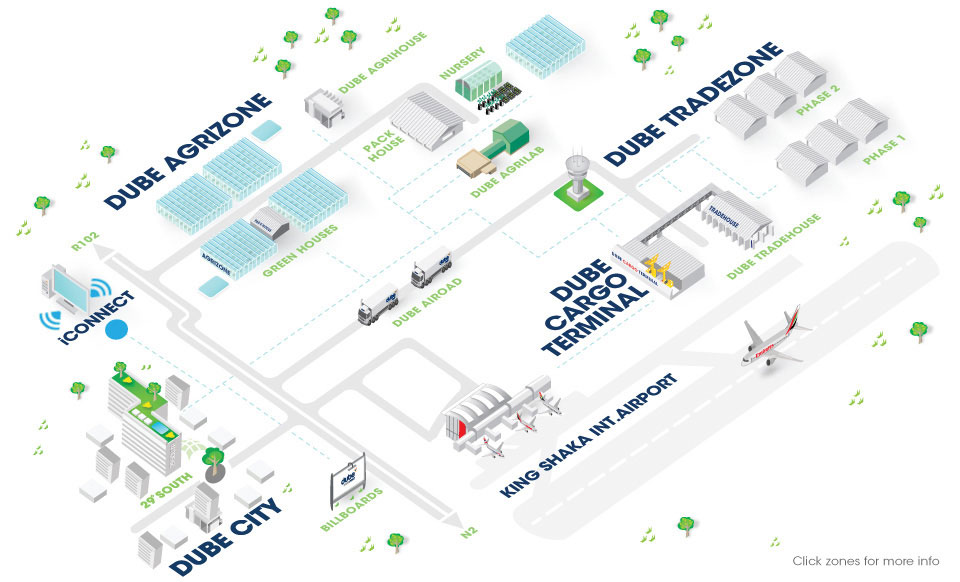News
Moves to reindustrialise SA’s economy

It’s been named among South Africa’s top 10 investment opportunities. The Dube TradePort in Durban is now officially an Industrial Development Zone (IDZ), joining three other similar economic zones spread out across the country.
President Jacob Zuma on Tuesday handed over an IDZ operator licence to the Dube TradePort Corporation signalling a new beginning for the precinct which has already attracted investments worth nearly R1billion since it was opened in 2012.
“Our presence here today is another step forward in our work towards creating more jobs that would alleviate poverty amongst our people,” President Zuma said at the ceremony held at King Shaka International Airport.
The Dube TradePort IDZ is the latest in the nationwide rollout of special economic zones aimed at growing the country’s economy to meet the target of five percent growth by 2019.
As the first IDZ for Durban, the Dube TradePort IDZ joins a list of other similar projects which have attracted a combined Investment of over R5 billion in Port Elizabeth, East London and Richards Bay. According to Trade and Industry Director General Lionel October more special economic zones will be rolled out across the country as government intensifies its approach to industrialise South Africa’s economy as demanded by the National Development Plan (NDP).
Special economic zones
October says government has identified IDZs as the most effective way to grow the South African economy. The special economic zones are also crucial in the job creating drive which remains high on government’s agenda.
“We are suffering with slow growth and we are going to reindustrialise this country. We need to fast-track economic development and the special economic zones are the way of fast racking development but also to decentralise development,” he told SAnews.
“Naturally investors want to relocate towards the big centres of the economy like Johannesburg because it’s closer to the market. Through these IDZs we want to attract investors to the new areas like the Dube TradePort, Coega, Richards Bay and the East London IDZ,” said October.
This is a sentiment shared by Trade and Industry Minister Rob Davies who said the concept of special economic zones has been shown in South Africa and in many other parts of the world to have been useful tools to promote industrial development and diversification of the economy.
“These are the industries that are largely supporting our export markets and are located in ports and around airports. In the life of the last administration we looked critically in what we can achieve from the special economic zones programme. I can say today that the three active IDZs (Coega, East London and Richards Bay) have now attracted investment worth five billion in total so the strategy is working,” Minister Davies said.
He said government was in the process of setting up a Special Economic Zones Board which will advise the minister on the implementation and proclamation of special economic zones.
Tax incentives
Minister Davies said what makes the IDZs unique is that they offer a variety of incentives for investors, including a 15 percent corporate tax rate, employment tax as well as duty free on imported equipment.
Situated at the heart of King Shaka International Airport, the Dube TradePort IDZ is set to transform Kwazulu-Natal into both a key business gateway and a noteworthy player in the global supply chain of goods. Two investment areas will be crucial in the success of the IDZ and they are the Dube TradeZone, and the Dube AgriZone.
The main sectors that have been identified include electronics manufacturing and assembly, aerospace and aviation-linked manufacturing, agriculture and agro processing, medical and pharmaceutical production as well as clothing and textiles.
President Zuma said the Dube TradePort is expected to create more than 150 000 jobs by 2060 the same year the development is envisaged to contribute R5.6 billion to the country’s GDP.
“The Dube TradePort is yet another good story to tell. We are determined to create an environment that is investor friendly. We will continue to improve support measures both through the special economic zones and other development tool,” President Zuma said.
He said the people of KwaZulu-Natal will judge the success of the new development by the manner in which it changes their lives through job creation.





